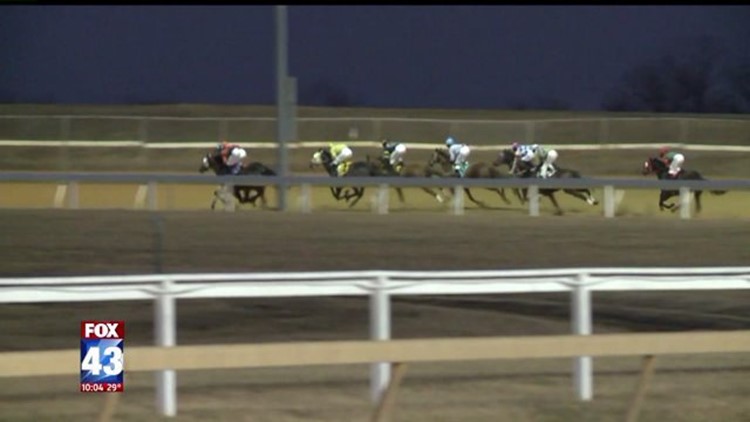Advocates for improved safety in horse racing are calling for sweeping changes in Pennsylvania, a matter they say has been underscored by a recent criminal investigation at Penn National Race Course in Dauphin County.
Last November, a federal grand jury indicted three trainers and a track employee. The trainers, David Wells, Sam Webb and Patricia Rogers were accused of fraud after allegedly trying to dope horses with medications not permitted within 24 hours of a race.
Danny Robertson, who was employed at the track as a clocker, allegedly provided false workout times in exchange for cash.
All four pleaded not guilty and are awaiting trial.
Penn National spokesman Fred Lipkin said the four were banned from the track and called them “a few bad apples.” Lipkin declined a request for an on-camera interview.
But, in interviews with industry insiders, elected officials and safety advocates, FOX43 learned the case highlights a larger plight within the horse racing industry.
“It won’t last 20 years. It really won’t. People can’t go on like this,” said Gretchen Jackson, who’s owned race horses since the 1970s.
She owned Barbaro, the horse that won the 2006 Kentucky Derby, only to be injured two weeks later during the Preakness. Barbaro was put down several months later. Since then, Jackson has become an outspoken advocate for improved integrity in racing.
“It’s up to the human beings, the trainers, the owners, to stick up for the horse,” said Jackson.
Over the years, she says regulators have struggled to keep up with drug testing as people find new ways to give horses the winning edge.
“There’s a lot going through that should be picked up,” said Jackson. “I’ve heard everything from aspirins to Viagra, frog juice to (cobra) venom.”
The New York Times recently investigated the industry and found on average 24 horses die at tracks across the country each week. (For more information on that investigation click here).
“The overuse and abuse of medication is rampant at our thoroughbred racetracks and training centers,” said Dr. Kathryn Papp, a veterinarian based at Penn National, during an April 2012 Congressional hearing on safety in horse racing.
She added, “It is not uncommon for me to see on race day a practitioner enter a stall in one of the private barns or the detention barn with three to ten syringes full of medication to administer and not be questioned by anyone.”
Since then, the Pennsylvania Horsemen’s Benevolent and Protective Association said it has worked to improve oversight, saying new security protocols helped to catch two of the people indicted last fall.
The association’s executive director did not respond to requests for an interview.
According to the Jockey Club, a national organization “dedicated to the improvement of thoroughbred breeding and racing,” the average purse per race in Pennsylvania has quadrupled since the early 90s, helped by the expansion of casino gaming.
In 1992, the average purse per race was $7,304. That increased to $28,705 in 2012.
At the same time, the state’s Horse Racing Commission and Harness Racing Commission, which are tasked with overseeing racing in Pennsylvania have run into financial challenges. The commissions nearly ran out of money before state lawmakers stepped in with an emergency appropriation in December, according to state Sen. Elder Vogel (R-47th).
Gretchen Jackson says enforcement has been lax, an issue that is not unique to Pennsylvania.
The Racing Medication and Testing Consortium tracks rulings state commissions make regarding penalties against trainers and others in horse racing.
According to the consortium’s records in 2013 (click here), fines for violations in thoroughbred racing ranged from $250 to $1,250.
“They’re not really tough punishments. They’re not tough enough,” said Jackson.
It’s been nearly 30 years since the state updated the laws governing horse racing.
“The (agriculture) budget’s been cut several years, and the funding comes out of the Ag budget. So, they literally got to the point where they couldn’t rob Peter to pay Paul,” said Vogel.
He and the state Senate leadership have proposed a series of reforms, including dissolving the existing racing commissions and giving oversight to the Pennsylvania Gaming Control Board.
“I think there’s just too many people right now, and so by bringing it all into one and not having different groups of different people going different directions, you’ll be able to have it all under one roof and have people in the same room controlling things,” said Vogel.
Vogel’s bill calls for increased fees and fines as well as for horse trainers to pay for drug testing. To read the bill, click here.
“Being able to keep integrity at the highest level is the most important thing we have, and I guess the biggest part of this legislation is to see that the drug testing is done properly,” said Vogel, who pointed out the industry supports about 20,000 jobs statewide.
Vogel’s bill cleared the Senate Agriculture Committee earlier this month. It awaits a vote by the full Senate.
Editor’s Note: This story is the first in a series on horse racing in Pennsylvania. The second part will air Tuesday night at 10 p.m. and will focus on efforts to regulate the industry nationwide.



